Effective Insecticides for Mosquito Control: A Comprehensive Guide
2025-03-24

Mosquitoes are not only a nuisance but also pose significant health risks by spreading diseases such as malaria, dengue fever, and Zika virus. Therefore, effective mosquito control is crucial in agricultural settings where crops and livestock are present. Insecticides for mosquitoes are a key component in integrated pest management (IPM) strategies, providing farmers and agricultural professionals with tools to manage these pests responsibly and effectively.
When selecting an insecticide for mosquito control, it is essential to consider several factors, such as the mode of action, residual activity, and the specific mosquito species you are targeting. There are primarily two categories of insecticides: adulticides and larvicides. Adulticides are used to kill adult mosquitoes, while larvicides target the immature stages of the mosquito lifecycle.
Adulticides often contain active ingredients such as pyrethroids, which are synthetic chemicals modeled after natural pyrethrins. These compounds work by disrupting the nervous system of mosquitoes, leading to rapid paralysis and death. It is essential to apply adulticides during peak mosquito activity times, usually in the early morning or late evening, to maximize their effectiveness.
On the other hand, larvicides are used to prevent mosquito populations from growing by targeting the larvae in standing water, where mosquitoes breed. Common active ingredients in larvicides include methoprene and Bacillus thuringiensis israelensis (Bti), a bacterium that is toxic to mosquito larvae but safe for other wildlife. Applying larvicides in identified breeding sites can significantly reduce mosquito populations and their ability to reproduce.
To enhance the efficacy of insecticides for mosquitoes, it's crucial to follow label instructions meticulously. This includes recommended application rates, timing, and safety precautions. Additionally, integrating insecticide use with other pest management practices, such as source reduction (eliminating standing water) and biological controls (using natural predators), can provide a more holistic approach to mosquito management.
It's also important to note that resistance to insecticides can develop over time. To combat this issue, rotating between different classes of insecticides can help maintain their effectiveness. Regular monitoring and assessment of mosquito populations will inform your pest control decisions and allow for timely interventions.
In conclusion, using the right insecticides for mosquitoes, along with a comprehensive IPM approach, can significantly reduce mosquito populations and their associated risks in agricultural settings. By staying informed about the best practices and advances in pest management, agricultural professionals can effectively safeguard their crops and communities from the threats posed by these pervasive pests.
Recommend News
Contact Us
Leave Us A Message


